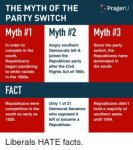Never heard that. Which historians?
Just check this out for yourself and why don't you play historian for us?
At the same time, the War was not going well for the Union. Lincoln said, "I have been driven many times upon my knees by the overwhelming conviction that I had nowhere else to go." Later, as he was preparing to issue the preliminary Emancipation Proclamation, Lincoln said, "I made a solemn vow before God, that if General Lee was driven back from Maryland I would crown the result by the declaration of freedom to the slaves."
Later, while trying to put into words, from a divine perspective, the necessity of the Civil War, he wrote:
"The will of God prevails. In great contests each party claims to act in accordance with the will of God. Both may be, and one must be, wrong. God cannot be for and against the same thing at the same time. In the present civil war it is quite possible that God's purpose is something different from the purpose of either party -- and yet the human instrumentalities, working just as they do, are of the best adaptation to effect His purpose. I am almost ready to say that this is probably true -- that God wills this contest, and wills that it shall not end yet. By his mere great power, on the minds of the now contestants, He could have either saved or destroyed the Union without a human contest. Yet the contest began. And, having begun He could give the final victory to either side any day. Yet the contest proceeds."
In 1863, after the Battle of Gettysburg, Lincoln issued the first Federally mandated Thanksgiving Day to be kept on the last Thursday in November. Reflecting on the successes of the past year, Lincoln said:
"No human counsel hath devised nor hath any mortal hand worked out these great things. They are the gracious gifts of the Most High God, who, while dealing with us in anger for our sins, hath nevertheless remembered mercy. It has seemed to me fit and proper that they should be solemnly, reverently and gratefully acknowledged as with one heart and one voice by the whole American People. I do therefore invite my fellow citizens in every part of the United States, and also those who are at sea and those who are sojourning in foreign lands, to set apart and observe the last Thursday of November next, as a day of Thanksgiving and Praise to our beneficent Father who dwelleth in the Heavens."
In 1864, some former slaves in Maryland presented Lincoln with a gift of a Bible. Lincoln replied:
"In regard to this great book, I have but to say, it is the best gift God has given to man. All the good the Saviour gave to the world was communicated through this book. But for it we could not know right from wrong. All things most desirable for man’s welfare, here and hereafter, are to be found portrayed in it."
In September 1864, Lincoln, placing the Civil War squarely within a divine province, wrote in a letter to a member of the Society of Friends (Quakers),
"The purposes of the Almighty are perfect, and must prevail, though we erring mortals may fail accurately to perceive them in advance. We hoped for a happy termination of this terrible war long before this; but God knows best, and has ruled otherwise...we must work earnestly in the best light He gives us, trusting that so working still conduces to the great ends He ordains. Surely He intends some great good to follow this mighty convulsion, which no mortal could make, and no mortal could stay."


